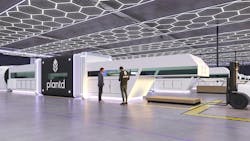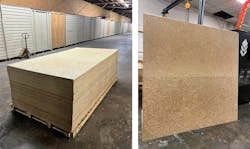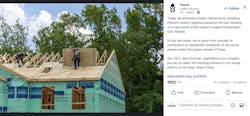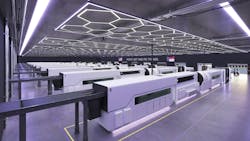The nation’s largest homebuilder, D.R. Horton, is collaborating with innovative startup Plantd to install 250,000 alternative structural panels in over 1,000 homes. What makes the panels alternative? They’re made from grass—fast-growing, carbon-capturing perennial grass that Plantd touts as a solution to climate change.
As a manufacturer of structural carbon-negative building materials, Plantd provides a seamless switch for homebuilders currently using Oriented Strand Board (OSB). The company’s collaboration with D.R. Horton signifies a major shift in today’s sustainability-driven homebuilding landscape.
D.R. Horton’s purchase of 250,000 Plantd panels will be used for wall sheathing and roof decking. The partners will first erect a model home—breaking ground in mid-July—in Durham, N.C., before full-scale production and delivery is expected to begin in 2024.
Plantd’s Grassroots Panel Production
Plantd’s structural panels are composed of just two ingredients: the perennial grass and a small amount of resin (with the formaldehyde reacted out before it reaches Plantd’s factory). This creates a low-VOC product with less chemical additives compared to other products, according to the company.
The resulting panel is manufactured to the exact dimensions of traditional OSB, while being sustainable, stronger, and more moisture-resistant as well. Plantd estimates that its panels installed in every D.R. Horton home will sequester five tons of carbon dioxide removed from the atmosphere.
"This relationship enhances our capabilities to offer new buyers homes that are affordable, durable, and sustainable,” said Mike Murray, Co-COO of D.R. Horton.
In fact, D.R. Horton was instrumental in Plantd’s path to testing and certifying its panels. The builder has acted as a thought partner for the startup, providing valuable market feedback, and even assisted in finding a third party lab for the certification process. What makes Plantd so valuable in the long run—aside from its resonating climate change story—is the switch away from trees. With material shortages still affecting the market, builders are looking for ways to diversify their supply chain with a reliable and consistent product.
RELATED: Sustainable, Structural Panels Made From Grass
Aside from D.R. Horton, Plantd has received interest in half of the top 10 builders in the country, according to Josh Dorfman, co-founder and CEO of Plantd. The startup has also been in talks with other industries, like furniture manufacturing, as its product may have many other applications to be explored in the future.
Finishing the Factory of the Future
What’s in store for Plantd as the year enters its last half?
Part of the company’s mission is to develop an all-electric, automated, and inventive “factory of the future.” The startup estimates that with its system, it can produce the same amount of material as wood OSB while using nine times less land—due to the fast-growth rates of grass-farming coupled with its near-zero waste production process.
By this Fall, Plantd hopes to get its first automated machine up and running, before inviting builders to see the technology in action at Plantd’s Oxford, N.C., factory. The factory is being repurposed from an old tobacco factory, granting plenty of space for the company to build its commercial production line. With modular machines as long as 140 feet, Plantd aims to expand into other product categories like sub-flooring and two-by-fours.




